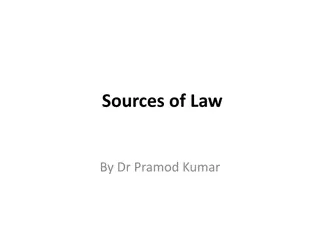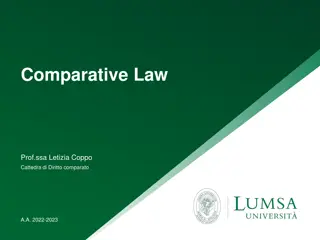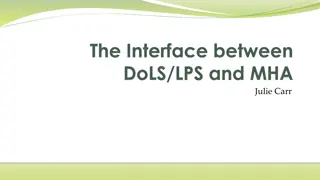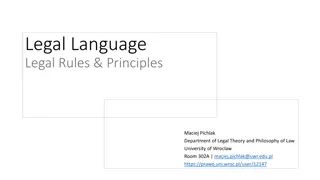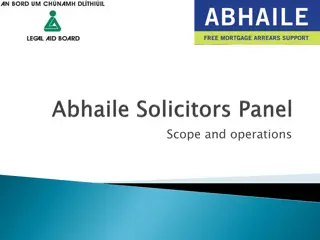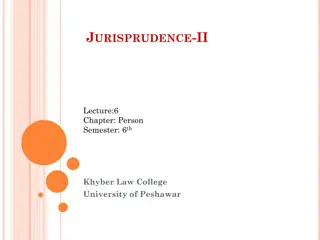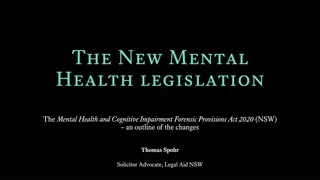Exploring the Legal System and Legislation of the EU
This content discusses the legal system and legislation of the European Union (EU), focusing on sources of EU law, supranationalism, intergovernmentalism, deepening, widening, and EU law-setting relevance. It explores the adoption of legislative acts, including ordinary legislative procedures and special legislative procedures, shedding light on the significant role of the European Parliament in the law-making process.
Download Presentation

Please find below an Image/Link to download the presentation.
The content on the website is provided AS IS for your information and personal use only. It may not be sold, licensed, or shared on other websites without obtaining consent from the author. Download presentation by click this link. If you encounter any issues during the download, it is possible that the publisher has removed the file from their server.
E N D
Presentation Transcript
NATIONAL NATIONAL UNIVERSITY UNIVERSITY OF OF PUBLIC PUBLIC SERVICE SERVICE FACULTY OF INTERNATIONAL AND EUROPEAN STUDIES Legal System of the EU INITB133 Dr. Mikl s Szirbik, LL.M. 30.09.2019
Mikls Szirbik, Mikl s Szirbik, Legal System Legal System of of the the EU EU Legislation in the EU
Mikls Szirbik, Mikl s Szirbik, Mikl s Mikl s Szirbik Szirbik, Legal System of the EU , Legal System of the EU Repeating of last two weeks: - Which are the sources of EU law? - Explain the terms supranationalism and intergovernmentalism! - How would you describe deepening and widening related to European Integration?
Mikls Szirbik, Mikl s Szirbik, Mikl s Mikl s Szirbik Szirbik, Legal System of the EU , Legal System of the EU Legislation in the EU RELEVANCE of EU law-setting The largest Economy in the world, close to 500 Mio citizens: During the 7th legislature (2009-2014) the Commission presented 584 proposals falling under the co- decision/legislative ordinary procedure, up from 508 during the 6th legislature (2004-2009) and 432 during the 5th legislature (1999-2004). During the 7th legislature, proposals for the co-decision/ordinary legislative procedure amounted to 89% of all 658 legislative proposals from the Commission, compared to 49% during the 6th legislation (out of 1041 proposals), 42% during the 5th legislation (out of 1028 proposals) and 21% during the 4th legislation (1994-1999).
Mikls Szirbik, Mikl s Szirbik, Mikl s Mikl s Szirbik Szirbik, Legal System of the EU , Legal System of the EU Legislation in the EU Forms of EU law-setting In the adoption of legislative acts, a distinction is made between the ordinary legislative procedure (codecision), which puts Parliament on an equal footing with the Council, and the special legislative procedures, which apply only in specific cases where Parliament has only a consultative role. On certain questions (e.g. taxation) the European Parliament gives only an advisory opinion (the consultation procedure ). In some cases the Treaty provides that consultation is obligatory, being required by the legal base, and the proposal cannot acquire the force of law unless Parliament has delivered an opinion. In this case the Council is not empowered to take a decision alone.
Mikls Szirbik, Mikl s Szirbik, Mikl s Mikl s Szirbik Szirbik, Legal System of the EU , Legal System of the EU Legislation in the EU Consultation The European Parliament may approve or reject a legislative proposal, or propose amendments to it. The Council is not legally obliged to take account of Parliament s opinion but in line with the case-law of the Court of Justice, it must not take a decision without having received it. In the beginning, the 1957 Treaty of Rome gave Parliament an advisory role in the legislative process; the Commission proposed and the Council adopted legislation. The Single European Act (1986) and the Maastricht, Amsterdam, Nice and Lisbon Treaties successively extended Parliament s prerogatives. It can now co-legislate on equal footing with the Council in a vast majority of areas (see Ordinary legislative procedure) and consultation became a special legislative procedure (or even a non-legislative procedure) used in a limited number of cases. This procedure is now applicable in a limited number of legislative areas, such as internal market exemptions and competition law. Parliament s consultation is also required, as a non-legislative procedure, where international agreements are being adopted under the Common Foreign and Security Policy (CFSP).
Mikls Szirbik, Mikl s Szirbik, Mikl s Mikl s Szirbik Szirbik, Legal System of the EU , Legal System of the EU Legislation in the EU The ordinary legislative procedure The ordinary legislative procedure gives the same weight to the European Parliament and the Council of the European Union on a wide range of areas (for example, economic governance, immigration, energy, transport, the environment and consumer protection). The vast majority of European laws are adopted jointly by the European Parliament and the Council. The codecision procedure was introduced by the Maastricht Treaty on European Union (1992), and extended and made more effective by the Amsterdam Treaty (1999). With the Lisbon Treaty that took effect on 1 December 2009, the renamed ordinary legislative procedure became the main legislative procedure of the EU s decision-making system.
Mikls Szirbik, Mikl s Szirbik, Mikl s Mikl s Szirbik Szirbik, Legal System of the EU , Legal System of the EU Legislation in the EU Ordinary legislative procedure Art. 294 TFEU 1. Where reference is made in the Treaties to the ordinary legislative procedure for the adoption of an act, the following procedure shall apply. 2. The Commission shall submit a proposal to the European Parliament and the Council. Question: what does the term act cover in Art. 294 paragraph 1? Support your answer with a relevant Article of the TFEU discussed in earlier classes!
Mikls Szirbik, Mikl s Szirbik, Mikl s Mikl s Szirbik Szirbik, Legal System of the EU , Legal System of the EU Legislation in the EU Ordinary legislative procedure Art. 294 TFEU First reading according to paragraphs 3-6 of Art. 294 TFEU 3. The European Parliament shall adopt its position at first reading and communicate it to the Council. 4. If the Council approves the European Parliament's position, the act concerned shall be adopted in the wording which corresponds to the position of the European Parliament. 5. If the Council does not approve the European Parliament's position, it shall adopt its position at first reading and communicate it to the European Parliament. 6. The Council shall inform the European Parliament fully of the reasons which led it to adopt its position at first reading. The Commission shall inform the European Parliament fully of its position.
Mikls Szirbik, Mikl s Szirbik, Mikl s Mikl s Szirbik Szirbik, Legal System of the EU , Legal System of the EU Legislation in the EU Ordinary legislative procedure Art. 294 TFEU Second reading according to paragraphs 7-9 of Art. 294 TFEU 7. If, within three months of such communication, the European Parliament: (a) approves the Council's position at first reading or has not taken a decision, the act concerned shall be deemed to have been adopted in the wording which corresponds to the position of the Council; (b) rejects, by a majority of its component members, the Council's position at first reading, the proposed act shall be deemed not to have been adopted; (c) proposes, by a majority of its component members, amendments to the Council's position at first reading, the text thus amended shall be forwarded to the Council and to the Commission, which shall deliver an opinion on those amendments. 8. If, within three months of receiving the European Parliament's amendments, the Council, acting by a qualified majority: (a) approves all those amendments, the act in question shall be deemed to have been adopted; (b) does not approve all the amendments, the President of the Council, in agreement with the President of the European Parliament, shall within six weeks convene a meeting of the Conciliation Committee. 9. The Council shall act unanimously on the amendments on which the Commission has delivered a negative opinion.
Mikls Szirbik, Mikl s Szirbik, Mikl s Mikl s Szirbik Szirbik, Legal System of the EU , Legal System of the EU Legislation in the EU Ordinary legislative procedure Art. 294 TFEU Conciliation according to paragraphs 10-12 of Art. 294 TFEU 10. The Conciliation Committee, which shall be composed of the members of the Council or their representatives and an equal number of members representing the European Parliament, shall have the task of reaching agreement on a joint text, by a qualified majority of the members of the Council or their representatives and by a majority of the members representing the European Parliament within six weeks of its being convened, on the basis of the positions of the European Parliament and the Council at second reading. 11. The Commission shall take part in the Conciliation Committee's proceedings and shall take all necessary initiatives with a view to reconciling the positions of the European Parliament and the Council. 12. If, within six weeks of its being convened, the Conciliation Committee does not approve the joint text, the proposed act shall be deemed not to have been adopted.
Mikls Szirbik, Mikl s Szirbik, Mikl s Mikl s Szirbik Szirbik, Legal System of the EU , Legal System of the EU Legislation in the EU Ordinary legislative procedure Art. 294 TFEU Third reading according to paragraphs 13-15 of Art. 294 TFEU 13. If, within that period, the Conciliation Committee approves a joint text, the European Parliament, acting by a majority of the votes cast, and the Council, acting by a qualified majority, shall each have a period of six weeks from that approval in which to adopt the act in question in accordance with the joint text. If they fail to do so, the proposed act shall be deemed not to have been adopted. 14. The periods of three months and six weeks referred to in this Article shall be extended by a maximum of one month and two weeks respectively at the initiative of the European Parliament or the Council. Special provisions 15. Where, in the cases provided for in the Treaties, a legislative act is submitted to the ordinary legislative procedure on the initiative of a group of Member States, on a recommendation by the European Central Bank, or at the request of the Court of Justice, paragraph 2, the second sentence of paragraph 6, and paragraph 9 shall not apply. In such cases, the European Parliament and the Council shall communicate the proposed act to the Commission with their positions at first and second readings. The European Parliament or the Council may request the opinion of the Commission throughout the procedure, which the Commission may also deliver on its own initiative. It may also, if it deems it necessary, take part in the Conciliation Committee in accordance with paragraph 11.
Mikls Szirbik, Mikl s Szirbik, Mikl s Mikl s Szirbik Szirbik, Legal System of the EU , Legal System of the EU Legislation in the EU Other legislative procedures Opinion under Article 140 Treaty on the Functioning of the European Union (monetary union) The Commission and the European Central Bank draw up reports for the Council on the progress in fulfilling their obligations as regards economic and monetary union of Member States with a derogation.After Parliament has delivered its opinion, the Council on the Commission s proposal, decides which Member States with a derogation fulfil the conditions for adoption of the single currency on the basis of the criteria laid down in Article 140(1) TFEU and ends these Member States derogations. In this procedure, Parliament votes for the amendments en bloc and cannot table amendments.
Mikls Szirbik, Mikl s Szirbik, Mikl s Mikl s Szirbik Szirbik, Legal System of the EU , Legal System of the EU Legislation in the EU Other legislative procedures Procedures relating to dialogue between management and labour The Union s objectives include promotion of dialogue between the two sides of industry, with a view to the conclusion of agreements and conventions.Under Article 154 TFEU, the Commission has the task of promoting the consultation of management and labour at Union level and thus submits to Parliament possible guidelines for Union action after consulting the two sides of industry. Any Commission document or any agreement between management and labour is referred to the Parliament committee responsible. Where management and labour have reached an agreement and have requested jointly that the agreement be implemented by a Council decision on a proposal from the Commission under Article 155(2) of the Treaty on the Functioning of the European Union, the committee responsible shall table a motion for a resolution recommending the adoption or rejection of the request.
Mikls Szirbik, Mikl s Szirbik, Mikl s Mikl s Szirbik Szirbik, Legal System of the EU , Legal System of the EU Legislation in the EU Other legislative procedures Procedures for the consideration of voluntary agreements The Commission informs Parliament when it intends to make use of voluntary agreements rather than legislation. The committee concerned may draw up an own-initiative report under Rule 48. The Commission informs Parliament when it intends to conclude a voluntary agreement. The committee responsible may table a motion for a resolution recommending adoption or rejection of the proposal and under what conditions.
Mikls Szirbik, Mikl s Szirbik, Mikl s Mikl s Szirbik Szirbik, Legal System of the EU , Legal System of the EU Legislation in the EU Other legislative procedures Codification Official codification means the procedure to repeal the acts being codified and replacing them by a single act. The consolidated version includes all modifications since the act first came into force. It does not contain any modification to the substance of the act. Codification helps to clarify EU legislation that has undergone frequent modifications. Parliament s committee responsible for legal affairs examines the Commission s proposal for codification. If there is no modification of substance, the simplified procedure for adoption of a report under Rule 46 applies. Parliament shall take a decision by means of a single vote, without amendment or debate.
Mikls Szirbik, Mikl s Szirbik, Mikl s Mikl s Szirbik Szirbik, Legal System of the EU , Legal System of the EU Legislation in the EU Common approaches related legislative procedures Annual and multiannual programming According to the Treaty, the Commission shall initiate the Union s annual and multiannual programming. In view of achieving that goal, the Commission prepares its work programme, which is its contribution to the Union s annual and multiannual programming. The European Parliament already cooperates with the Commission in the process of drafting the Commission s work programme and the Commission shall take into account the priorities expressed by Parliament at that stage. Following its adoption by the Commission, a trilogue between Parliament, the Council and the Commission is foreseen with a view to reaching an agreement on the Union s programming. Detailed arrangements, including a timetable, are set out in Annex XIV of the Rules of Procedure (Framework Agreement on relations between the European Parliament and the European Commission). Parliament adopts a resolution on the annual programming. The President asks the Council to deliver an opinion on the Commission s work programme and Parliament s resolution. Where an institution is unable to comply with the timetable laid down it is required to notify the other institutions as to the reasons for the delay and to propose a new timetable.
Mikls Szirbik, Mikl s Szirbik, Mikl s Mikl s Szirbik Szirbik, Legal System of the EU , Legal System of the EU Legislation in the EU Summary material of EP related to legislation with additional information: https://www.europarl.europa.eu/about-parliament/hu/powers-and-procedures/legislative-powers
Mikls Szirbik, Mikl s Szirbik, Mikl s Mikl s Szirbik Szirbik, Legal System of the EU , Legal System of the EU Practical example related to EU legislation OPINION OF ADVOCATE GENERAL BOT delivered on 26 July 2017 (1) Cases C-643/15 and C-647/15 Slovak Republic, Hungary v Council of the European Union http://curia.europa.eu/juris/document/document.jsf?text=&docid=193374&pageIndex=0&doclang=EN&mode=lst&dir=&occ=first&part=1&cid=1225142
Thank you for your attention! Thank you for your attention!




